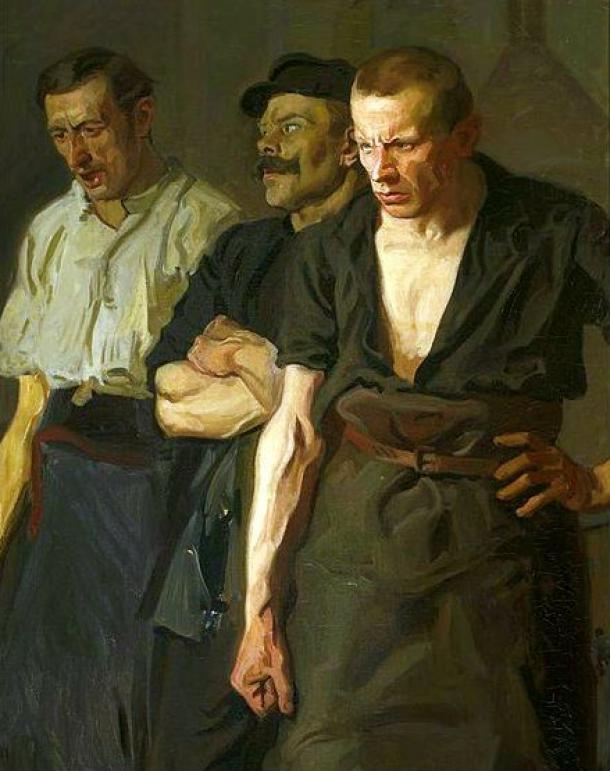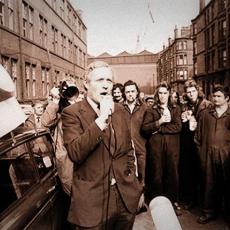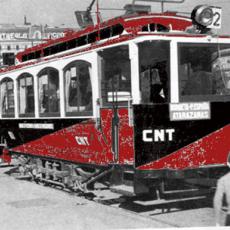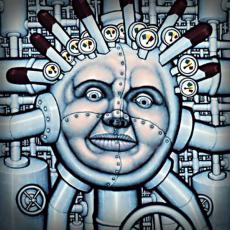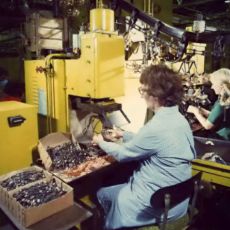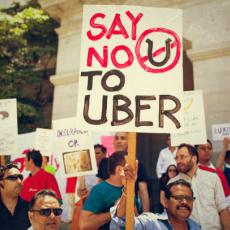Rosa Luxemburg and the Revolutionary Antiwar Mass Strikes in Germany during World War I
Since 1906 Rosa Luxemburg was the outstanding protagonist of the revolutionary mass strike idea in Germany. After having participated for some months in the First Russian Revolution of 1905/06 she published her important essay “Mass Strikes, Political Party and Trade Unions”. Luxemburg recommended the mass strike as a mean of pressure for getting more democratic rights. Important to mention is: The actions should not happen by command of the leadership but the proletarian masses should decide themselves the way of the actions and the details of the steps while the party leaders should give only a wide frame of issues and purposes and also the motivation and encouragement.
A few words on the political conditions in Germany before World War I: The German Empire was a state of half-absolutism. There was a parliament – Reichstag - with the only effective right of accepting or rejecting the budget. But this was a powerless instrument because in the case of rejection the imperial government would order new elections which happened twice in the last 20 years before the war. Very undemocratic conditions ruled in the powerful German state of Prussia which king was also the emperor of the German Reich. In Prussia there was the so called “ Drei-Klassen-Wahlrecht“ (“Three-Class- Franchise”). That means that the vote of a rich man was a hundred times more worth than the vote of a worker.
In the following pre-war years the discussion in the German Social Democratic Party (SPD) came up again and again whether there was the right time to start a campaign for a political strike. Though the SPD was rapidly growing the party leadership became more and more hesitating and cautious in fear of government repression while the left wing urged for an offensive tactic and Luxemburg was the leading speaker and writer of this group.
The mass strike discussion was also a crucial issue on the international level of the social democratic movement. At the congress of the Socialist International in 1907 with the participation of Luxemburg and Lenin the famous anti war resolution was formulated and unanimously accepted by the conference. It obliged the socialist parties to use all means to prevent war. If this would be not successful they had to use all means to end the war and to use the misery of war to speed up the break down of the capitalistic system. But with the exception of the Serbian and part of the Russian party the socialist parties did not act according to the 1907 resolution of the Socialist International but supported their governments in their war efforts.
Rosa Luxemburg during War Time
For Luxemburg it was not only a great disappointment when in August 1914 the German socialist members of parliament accepted the war credits unanimously and the party gave up her fundamental opposition to the imperial government. At the first moment this seemed to be the complete destruction of her political life work. From contemporary sources we know that she had a grave psychological breakdown when she heard the news of voting for the war credits by the social democratic members of parliament.
But nevertheless, right from the first days of war Rosa Luxemburg with some political friends like Clara Zetkin, Franz Mehring and Wilhelm Pieck, joined soon by the member of parliament Karl Liebknecht, tried to regain the party for the old principles of the SPD. They tried to organize the left wing and to agitate in the party for a return to a socialist antiwar policy. More and more members of the party joined them. But altogether it was still a small number. As one success in December 1915 20 SPD members of the Reichstag rejected the war credits and thus broke the ‘holy discipline’ of the parliamentary group as Karl Liebknecht did already since December 1914. Finally in February 1917 this opposition group together with its followers was expelled from the SPD and founded in April 1917 an own party, the Independent Social Democratic Party of Germany (USPD).
The group around Luxemburg and Liebknecht had own initiatives though they worked at first together with the moderate opposition group around Hugo Haase and Georg Ledebour for more than one year. In January 1916 they separated from the moderate opposition, founded an own group “Gruppe Internationale” which was more well known as “Spartacus Group” (according to their illegal periodical “Spartacus”) and joined the USPD in April 1917 as an independent group.
The circle around Rosa Luxemburg the later named “Spartacus Group” contributed to the increase of the opposition in the SPD but another thing was the organizing of antiwar mass actions. In November 1915 the Berlin left Social Democrats organized an impressive peace demonstration in Berlin with several thousand persons. But other attempts of demonstrations in December 1915 and January 1916 failed for lack of participants so that the opposition groups didn’t dare another attempt for mass actions in the following months.
Repressions against the Opposition and its Socialist Anti War Agitation
As well for the inner party agitation as for the attempts for general mass actions the conditions were most unfavourable. Under the state of siege the political police and the military authorities prosecuted the organizational work of the SPD opposition and its agitation. Many members of the social democratic opposition were imprisoned for printing or distributing anti war pamphlets, for being involved in peace actions whether demonstration or strike. Especially the members of the Spartacus Group and other active left wing members were hit by these prosecutions. The result was that the left socialists were weakened intensively after every mass action and also in between. During the last weeks of the war most of the Spartacist and other left radicals leaders and even more of the left wing rank and file were in prison or – as an act of punishment - in the army. Thus most of the left socialist groups were eliminated or strongly weakened.
Also very important: There were only a very few SPD newspapers taking sides with the opposition. Even they could not write frankly because they were under strict censorship of the military authorities. Most of the SPD and trade unions newspapers and - of cause – all the bourgeois papers supported the war politics of the imperial government. The Spartacus pamphlets could not balance the overwhelming media power of the bourgeois and the right wing majority social democrats. Not to forget: the wide spread belief in the government authorities, in the proposed victory with the result of active support of the imperial government policies or at least passivity. These attitudes dominated not only in the bourgeois part of the population but also for a long time in the German proletariat.
The continuous repressions against the socialist peace activists and the superiority of the bourgeois media - including that of the majority social democrats - explain why only a very few political mass actions happened – in spite of the unexpected length of war with its innumerable victims, and in spite of the grave food shortage.
The Berlin Liebknecht Strike in June 1616
On 1 May 1916 in Berlin the peace demonstration by the Spartacus Group was half a success with about 2000 participants mostly members of the left socialist workers youth. But Karl Liebknecht was arrested out of the middle of the crowd and later on sentenced for more than 4 years of hard jail. This was the signal for Luxemburg to write a lot of pamphlets always with an appeal to protest against Liebknecht’s imprisonment and demand “Peace! Freedom! Bread!” Luxemburg’s long term comrade in the Russian-Polish socialist movement Leo Jogiches, living in Germany before and during the war, took care of printing and distributing the pamphlets. He was a master of clandestine work and it was due to his organizational talent that among the left wing social democracy the Spartacus group had the highest amount of illegal antiwar pamphlets. And most of those pamphlets were written by Luxemburg.
When the Spartacus Group organized at the end of June 1916 a protest demonstration against the Liebknecht trial for the first time the informal group of left shop stewards in the metal unions (in November 1918 known as “Revolutionäre Obleute”, Revolutionary Shop Stewards) supported this action and even organized the day after the demonstration a strike in favour of Liebknecht with 55.000 workers of the Berlin factories. This was the first political strike in Germany during World War I.
The Bread Strike in Berlin and Leipzig in April 1917
In the following months all efforts of the Spartacus Group with many pamphlets to motivate for new strikes failed. Even when in the winter of 1916, 1917 the food shortage was worsening and Germany was near to a famine all winter there were no signs of anti war mass actions. It needed the announced reduction of the bread ration that the left shop stewards in the middle of April called for a 3 day strike in Berlin with 200.000 workers participating and demanding only for more food without political contents. The Spartacus Group distributed three pamphlets and achieved that 25.000 workers continued the strike asking not only for more food, but also for peace and democracy. There were also strikes in Leipzig with 30.000, in Magdeburg and Kiel with 10.000 participants in each city. In the last 3 cities there were political demands from the beginning on. Altogether it was the first great antiwar strike movement in Germany. The Spartacus Group supported the action with three leaflets and in Berlin and had some members in the strike committee. The main organizing persons again were the left shop stewards and in Leipzig local officials of the new founded USPD.
The Great Ammunition Workers Strike in January 1918
After the April strikes in 1917 several attempts were made in the following months of the year to initiate new strikes but they failed. Not sooner than at the end of 1917 the left shop stewards urged the USPD leadership for a new mass strike. One stimulating factor was the hesitating German government in the peace negotiations with the Lenin government.
The left shop stewards also contacted the leader of the Spartacus Group Leo Jogiches for supporting their attempts to win the USPD leadership for a public appeal for a mass strike. He could arrange that in the USPD central committee the Spartacus members from Stuttgart and Brunswick supported the left shop stewards. Finally in January 1918 the USPD distributed a leaflet with an indirect appeal for a mass strike to achieve peace. Unfortunately the USPD leaflet was seized by the police in several cities. But before and during the action the Spartacus Group had distributed eight different strike leaflets, each of them between 25.000 and 200.000 copies. All over Germany there were more than half a million workers on strike. In Berlin even a Workers Council was created. But the military authorities suppressed the action from the beginning on. A lot of the strike leaders were sentenced, several ten thousand striking workers in Berlin were sent to the army. Though the strike action itself was successful according to the number of participants the action had no effect regarding the appeals for peace, democracy and more food. It looked as if the imperial government had won again using a hard suppression policy. Therefore all attempts on further strikes in the next months were given up by the left socialists. The situation was so discouraging that the German revolutionaries did not expect further mass actions but in winter1918/19. Additionally one must know that the Spartacus Group at the end of March 1918 did not lose only his leader Leo Jogiches but a lot of the Spartacist comrades involved in clandestine work by imprisonment. Jogiches’ successor Karl Schulz and his little group was arrested in August 1918, members of regional groups in September and October 1918, too.
The Successful Mass Action: the November Revolution 1918
At the end of September 1918 the defeat of the German army got known to the public and the military leaders Hindenburg and Ludendorff asked the politicians to start armistice negotiations. It was not sooner than at this moment that the socialist revolutionaries became hopeful again. But even at the end of October and in the very first days of November the mood of the workers was not in favour of a revolutionary mass action, neither in the Berlin factories nor in most of the left socialist groups all over Germany.
So the spontaneous outbreak of the revolutionary movement in the German harbour cities spreading across the country to western Germany since 4 November was a big surprise not only to the general public but also to the left socialists who had been working in favor of revolutionary mass actions for years.
There were two revolutionary mass movements: The sailors taking the revolutionary flame from the coast to the interior of the country and awakening the workers and soldiers for the upheaval forming ‘Workers and Soldiers Councils’ like in Russia. A special development had Munich were the USPD leader Kurt Eisner gave the initiative for the revolution. Another special case was Hanau a city near Frankfurt/Main where the strong Spartacus Group seized power. In Berlin the massive antirevolutionary propaganda of the government, of the majority social democrats who had joined the government, and of the whole bourgeois media contributed to the passivity of the workers. Therefore the ‘Revolutionary Shop Stewards’ postponed the uprising in Berlin to the 11 of November, though Liebknecht and the Spartacists urged for an earlier action. When on 8 November the Berlin police started with arresting some left socialist leaders the revolutionary committee at once shifted the date of uprising to the 9 November distributing leaflets for the action and giving arms to the workers. In spite of all the antirevolutionary propaganda the workers in almost all Berlin factories followed the appeal for uprising. So the old powers had to retreat in Berlin as well. The revolution was victorious all over Germany.
Rosa Luxemburg Ideas on a Revolution
Luxemburg didn’t return from custody to her friends in Berlin but on the late 10 of November when the main revolutionary events were over. Most of the time during World War I Luxemburg was imprisoned. But since her leaflets were smuggled out of prison she had been the author of most of the Spartacus pamphlets which often ended with the slogans “Peace! Freedom! Bread!” This was her way to fulfil the 1907 resolution of the Socialist International obliging the social democratic parties to use the war and the upcoming crises to raise the revolutionary mood of the proletarians. At the same moment she hoped to win more and more of the rank and file of the SPD and later the USPD for revolutionary action.
Luxemburg knew that a revolutionary development will not happen by command but it needs many different political and social factors which will lead to the outbreak of revolution. The role of a socialist party is to prepare and to encourage the proletarians making suggestions for the way to the revolution giving them socialists issues. The leaders should not command the proletarian masses but go into an exchange of opinions with them using their creativity. This basic democratic concept was supposed not only for the path to revolution but for the revolution itself as she significantly describes in her manuscript “On the Russian Revolution”.
In the historical and political discussion very often the question has come up whether it would have been better when a left radical socialist party would have been founded during war time or in the first days of the November Revolution 1918 instead on 31 December 1918 as it happened then with the founding of the Communist Party of Germany. And Luxemburg was criticised by Marxist-Leninist historians in East-Germany and in the Soviet Union for her so called underestimation of the importance of party organization and her overestimation of the activity and creativity of the proletarian masses.
But under the hard suppression of the imperial government authorities during war time there was no possibility to form one more left socialist organization besides the USPD. In 1917 the left radicals of Bremen twice attempted to create a new leftist party for all Germany. But each time the Political Police arrested the participants of the conferences and the left radicals didn’t make another attempt. The Spartacus group itself went into the revolutionary days as a weakened association almost without rank and file who were either arrested or sent to the army.
Another crucial factor against a third social democratic party was the very strong demand for unity in the labour movement as the Spartacist leaders had to experience during the famous conference of the Berlin ‘Workers and Soldiers Council’ on the 10 of November 1918 and during the January fights 1919 in Berlin.
Because of this strong demand for unity Luxemburg’s tactic during the war and the first two months of revolution to stay in the Independent Socialist Party – USPD – for winning as much members of the USPD as possible for the Spartacus point of view was certainly right. Instead of founding the Communist Party on 31 of December 1918 the Spartacist leaders should have waited even a little longer because of the rapid radical development in those weeks. Much more USPD members would have joined the Spartacus party i.e. the Communist Party at the time of the USPD caucus in March 1919 enforcing the left radicals and supporting the revolutionary movement. But of cause we historians are always much smarter than the contemporary politicians.
